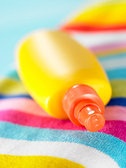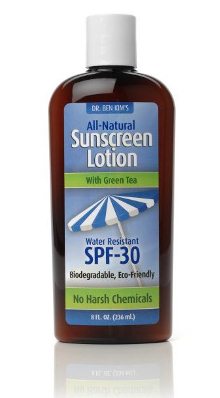You are here
Natural Ways to Protect Your Skin Against Sunlight-Related Damage
Skin cancer is now the most common type of cancer in the United States and in most first world nations. In the U.S. alone, more than one million new cases of skin cancer are expected in 2009.
With growing awareness of the importance of being smart about sun exposure, how is it that skin cancer is on the rise?
Part of the answer to this question likely lies in the growing trends of eating heavily processed foods and failing to acquire restful sleep. Most corners of our world thirst for convenience and stimulation, and regularly indulging in both can't be good for skin cancer rates.
Another part of the answer may involve the potentially harmful chemicals that are found in many commercial sunscreen formulas. It's true - some sunscreen lotions may be contributing to the development of skin cancers that they are intended to protect against. This hypothesis is partially supported by studies that indicate that the greatest rise in melanoma has occurred in nations where chemical sunscreens are heavily promoted and used.
Organizations like The Environmental Working Group have identified the following common sunscreen ingredients as being potentially harmful to human health:
-
Octocrylene
-
PABA
-
Octyl-methoxycinnamate (OMC)
-
Benzophenone-3
-
4-methyl-benzylidene camphor (4-MBC)
-
Homosalate
 If you've been using a sunscreen or sunblock product that contains one or more of these ingredients, there's no need to be overly alarmed; the potential dangers that are associated with use of these ingredients are mostly drawn from in vitro animal studies that don't provide conclusive proof that these ingredients can cause skin cancer.
If you've been using a sunscreen or sunblock product that contains one or more of these ingredients, there's no need to be overly alarmed; the potential dangers that are associated with use of these ingredients are mostly drawn from in vitro animal studies that don't provide conclusive proof that these ingredients can cause skin cancer.
But it is prudent to be aware that sunscreen lotions that contain any of the ingredients above are not the safest and healthiest choices to protect you against sunburn and sunlight-induced skin damage.
The vast majority of synthetic chemicals found in sunscreen lotions can potentially damage your skin by increasing the number of free radicals that are generated throughout the many layers of your skin.
Take for example, octocrylene - a clear, odorless, and slightly oily compound that is found in many brands of sunscreen. When applied to your skin, octocrylene can seep into the lower layers of your skin, where it can interact with ultraviolet rays from the sun, resulting in free radical production.
Free radicals have the potential to damage the DNA found in your cells, and if allowed to create ongoing damage, can contribute to the development of skin cancer.
Keep in mind that you're exposed to free radicals just about every moment of every day from the foods that you eat. Also, all of your cells actually produce free radicals on a regular basis, partly to help defend you against toxins, waste products, and microorganisms.
But you definitely don't want to expose your body to unnecessary helpings of free radicals via sunscreens that are loaded with synthetic ingredients.
So What Should You Do To Protect Yourself Against Sunburn and Sun-Related Skin Damage?
First, be aware that getting some sunlight on your skin can be immensely helpful to your health, mainly because UV-B rays in sunlight converts cholesterol found in your skin into vitamin D.
And ensuring adequate vitamin D status is essential to experiencing optimal health; every organ system in your body requires an adequate vitamin D level to function properly.
Today, vitamin D deficiency is actually one of the most common nutritional deficiencies in developed nations, most likely because the general public has been taught to be afraid of the sun.
The key to using sunlight to promote optimal vitamin D status is to be mindful of not getting burned. When your body has enough vitamin D to fuel its needs, it shuts off the mechanism that allows UV-B rays to convert cholesterol to vitamin D, so relying on healthy exposure to sunlight is actually the very best way to ensure healthy vitamin D status.
Second, when you're out and about and the sun is strong enough to cause you to burn, make good use of clothing and a hat that provide protection against UV rays. A good UV-hat, long sleeve shirt, and light pants go a long way in protecting your skin against sun-related damage.
Third, try to limit the amount of time you spend outdoors on extremely hot days and when the sun feels hottest - usually between 11 am and 2 or 3 pm.
Fourth, when you have to be out in conditions that can cause a sunburn and you can't rely on clothing and natural shade to protect your skin, use a natural sunscreen that relies on natural physical (not chemical) blockers and other all-natural ingredients to protect your skin against sun damage.
The natural sunscreen formula that Margaret and I use for ourselves and our children consists of the following ingredients:
Natural Sunscreen Lotion Inactive Ingredients:
 Green Tea Extract - is an excellent source of naturally occurring antioxidants, and is thought to help protect skin cells against sunlight-induced damage.
Green Tea Extract - is an excellent source of naturally occurring antioxidants, and is thought to help protect skin cells against sunlight-induced damage.
Shea Butter - is a highly effective, plant-based skin moisturizer.
Eucalyptus Oil - is an essential oil that moisturizes the skin and facilitates absorption of other healthy oils into your skin to help promote optimal skin tone.
Coconut Oil - is rich in healthy fatty acids that having soothing and moisturizing properties; coconut oil by itself is a highly recommended full body moisturizer.
Sunflower Oil - is also a plant-based oil that aids in moisturizing the skin.
Jojoba Oil - is a natural plant product that softens and soothes the skin - it's most commonly used to address or prevent dry or scaling skin.
Lecithin - is a natural plant compound that helps keep the skin hydrated and also acts to keep the skin baby soft.
Glycerine - is also a fragrance-free, natural compound that helps the skin maintain a healthy balance of water in its cells and cell membranes.
Xanthan Gum - is a natural plant compound that has hydrating properties and helps keep all of the healthy oils in this formula together.
Vitamin E (Tocopheryl acetate) - is included as a natural preservative.
Vitamin A - is also included as natural preservative. When applied topically, vitamin A is thought to keep skin cells healthy, optimally hydrated, and resistant to damage by sunlight and free radicals.
Natural Sunscreen Lotion Active Ingredients:
Zinc Oxide and Titanium Oxide - are both mineral compounds that can be found in nature. They're both fine white powders that act as physical blockers that prevent UV-A and UV-B rays from damaging the skin. Both are micronized forms, meaning that they're fine enough that they don't look goopy on the skin, but not nano-fine enough to potentially get absorbed into your bloodstream.
Together, all of the natural ingredients in our all-natural sunscreen lotion combine to form a water-resistant, hypoallergenic, and highly effective sunblock that's safe to use on kids and adults alike.
It smells quite pleasant, and is completely free of harsh chemicals. It's also free of nanoparticles.
Addendum on June 22, 2009: To answer a few queries regarding our all-natural sunscreen...
1. Shelf life is considered to be three years. But even after three years, this sunscreen lotion is still effective; it just may not look and smell as fresh.
2. Best storage conditions are in a low humidity environment with temperatures between 50 and 80 degrees Fahrenheit (that's 10 to 27 degrees Celsius).
3. Our all-natural sunscreen lotion doesn't clog or irritate pores, and works well for folks who have sensitive skin.
The Bottom Line
So long as you don't get burned, it's good for you to get some sunlight exposure on your skin.
When circumstances require that you stay outdoors for an extended period of time, your best first line of defense against sun-related skin damage is a hat with a wide brim, appropriate clothing, and shade if available.
Whenever you need extra protection against potentially damaging UV-A and UV-B rays, use a sunscreen lotion that relies on physical rather than chemical blockers, and that is free of harsh chemicals that may do more harm than good to your skin and overall health.
The natural sunscreen lotion that we use is available at our natural health shop here:
All-Natural Sunscreen Lotion, 8-Ounces, SPF 30
 Please note: If you're not completely satisfied with how effective this natural sunscreen lotion is, simply let me know and I'll see to it that you're given a full refund minus shipping.
Please note: If you're not completely satisfied with how effective this natural sunscreen lotion is, simply let me know and I'll see to it that you're given a full refund minus shipping.
Join more than 80,000 readers worldwide who receive Dr. Ben Kim's free newsletter
Receive simple suggestions to measurably improve your health and mobility, plus alerts on specials and giveaways at our catalogue
Please Rate This
Highest RatedNo articles have been rated for usefulness recently, please check later. | Related Posts | ||










